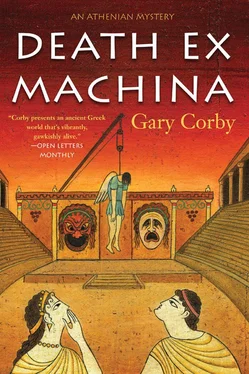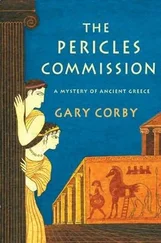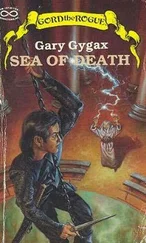Gary Corby - Death Ex Machina
Здесь есть возможность читать онлайн «Gary Corby - Death Ex Machina» весь текст электронной книги совершенно бесплатно (целиком полную версию без сокращений). В некоторых случаях можно слушать аудио, скачать через торрент в формате fb2 и присутствует краткое содержание. Год выпуска: 2015, ISBN: 2015, Издательство: Soho Press, Жанр: Исторический детектив, на английском языке. Описание произведения, (предисловие) а так же отзывы посетителей доступны на портале библиотеки ЛибКат.
- Название:Death Ex Machina
- Автор:
- Издательство:Soho Press
- Жанр:
- Год:2015
- ISBN:978-1-61695-520-5
- Рейтинг книги:3 / 5. Голосов: 1
-
Избранное:Добавить в избранное
- Отзывы:
-
Ваша оценка:
- 60
- 1
- 2
- 3
- 4
- 5
Death Ex Machina: краткое содержание, описание и аннотация
Предлагаем к чтению аннотацию, описание, краткое содержание или предисловие (зависит от того, что написал сам автор книги «Death Ex Machina»). Если вы не нашли необходимую информацию о книге — напишите в комментариях, мы постараемся отыскать её.
Death Ex Machina — читать онлайн бесплатно полную книгу (весь текст) целиком
Ниже представлен текст книги, разбитый по страницам. Система сохранения места последней прочитанной страницы, позволяет с удобством читать онлайн бесплатно книгу «Death Ex Machina», без необходимости каждый раз заново искать на чём Вы остановились. Поставьте закладку, и сможете в любой момент перейти на страницу, на которой закончили чтение.
Интервал:
Закладка:
I followed the Panathenaic Way northwest from the agora and on through Ceramicus. This was the deme where the potters worked, and it showed in the large clods of clay dropped here and there, and the men working with their hands behind their wheels, in workshops that were open to the road. None of them looked up as I passed. Nor did the people here seem as interested in the Dionysia as other parts of the city. Perhaps it was because they were too busy making money.
These men were famous throughout the world, because only they knew how to paint their handiwork with red figures on a black background. The red figure pots of Athens were one of our biggest exports. A “ceramic” jar could command an outrageous price in places where the potters weren’t as talented as ours.
Every second house had a serving hole cut into its front wall, with a wooden door that opened upward to form an awning for the women who served behind the counters. They hawked the wares that their husbands and sons had made in the workrooms. In Athens, every business is a family business. Even mine. Diotima was as much a part of my work as I was.
Ceramicus was also home to another place where business was booming: the city’s cemetery. I passed it on the right, and reflected that soon Romanos would be cremated here.
The other side of Ceramicus backed onto the double portal of the Dipylon Gates, the widest way in and out of Athens. Despite this, there were so many people coming into Athens that I had to step back and wait for the tide to ebb.
I passed the time with one of the guards at the gate. He swore at the visitors and told them to hurry along, talking to me between the cuss words.
“Most of this is people coming for the party,” he said to me.
“Then why are they all coming from outside?” I asked.
“They’re camping outside the city walls.” He spat on the ground, narrowly missing a tourist. The tourist scowled but took one look at the unhappy guard and decided to make nothing of it.
The guard said, “Have you seen what the inns are charging for a bed?” He spat again. “If it were me, I’d be sleeping on hard ground too, if I had to pay a week’s wages for one night.”
“And then a lot of them will stay for Dionysia.”
I looked back at the crowd entering Athens. The sight of all those happy people made me nervous.
Outside the gates was the deme known as Outer Ceramicus, not as salubrious as Inner Ceramicus, but close enough that it did good business with passersby. Outer Ceramicus gave way to groves of olive trees, sacred to the goddess Athena, and orchards, all within a walled park. The fruit was free for the picking and I didn’t hesitate.
I had arrived at the akademia -the Academy. The Academy housed the city’s third, newest, and most glorious gymnasium. Many years before my time it had been a run-down hovel. Then a nearby stream had been diverted to irrigate the land, and now it had become an earthly vision of the Elysian Fields.
The path to the gymnasium was lined with statues, and fountains fed by the stream. Three of the statues had been made by my father. I stopped to admire them as I passed.
The gymnasium was a thing of beauty, one of the first buildings in Athens to be made of marble and painted in bright reds and blues and yellows to contrast with the fine green grass. In the morning, with the sun at my back, it shone.
The wide entrance opened into a quadrangle lined on all sides with porticoes. Right away the sweet aroma of olive oil hit my nose, barely masking the musky odor of heavy sweat. Which was how the Academy always smelled, because every alcove in every portico about the inner courtyard was filled with naked men, fresh from exercise, all anointing themselves with oil.
Men looked up as I entered to see if I was someone they knew. This was a place where men came to socialize as much as to exercise. I wasn’t a regular at the Academy; the habitués didn’t recognize me and returned to their own affairs. I didn’t see Sophocles, nor did he hail me. I would have to wander around to find him.
I couldn’t walk straight across the sunlit inner yard because it was divided into training patches, each a shallow square pit filled with sand, five paces by five, where a man could exercise or two men could box, or wrestle, or practice the martial art called pankration. At this time of day the patches were all in use.
I didn’t expect to see Sophocles among the trainees and so wasn’t disappointed when I didn’t find him. I did however see my best friend, Timodemus. He stood by one of the patches, where two men fought a practice bout. They traded blows while Timodemus watched them with a jaundiced eye and barked instructions.
Timodemus was one of the best pankration fighters alive, famous for his victories in competition against other cities. He had recently retired from active fighting and moved with his new wife to a house not far from here. Now every day he came to the Academy, where he commanded outrageous fees as a coach.
Timodemus saw me and waved. He shouted, “ Chaire Nico! Greetings! Have you come for a practice round?”
I shook my head and called back, “I’m on business. Do you know where I can find Sophocles?”
Timo shrugged and returned his attention to his students. He probably didn’t even know who Sophocles was. My friend had no interest in plays, or philosophy. But he was really good at hurting people.
I felt a tap on my shoulder. I turned to see a wiry old man, shorter than me, with a friendly expression and not much hair. I knew him. This was Lysanias, one of the elders of Athens, who had helped me on a previous case. He was also unbelievably good at throwing quoits.
He said, “I thought I heard you, young fellow. How are you? Have you come to practice your quoit throws?”
This was the way of the gymnasium. As soon as you walked in, everyone who knew you would stop to talk, would demand your attention, if only for a moment, would invite you to stay for half a day or the whole day.
I had to shake my head regretfully, because I liked Lysanias and would gladly have spent time with him. “I’m sorry, sir, I’m here on business. I’m looking for Sophocles.”
“He’s in the next courtyard,” Lysanias said. “I saw him come in. I will show you to him. Then I will sit down with you and listen shamelessly to your conversation.” He led me by the arm. As we walked he said, “I know you, Nicolaos. If it is you who has work, should I take this to mean Athens is in dire peril? Is our city on the verge of destruction?”
“Only our reputation for staging plays,” I said. Somehow Lysanias had managed to miss what had happened, probably because he spent all his time in exercise. Though he was an old man, I would not want to face him in combat. I explained to Lysanias what had occurred, that the theater was polluted by murder, and that the Great Dionysia could not proceed unless the terrible crime was avenged.
Lysanias wasn’t a man to worry about trifles, yet at my words he looked stern and said, “This is more serious than you seem to think, young man.”
“I’m already aware how bad it is, sir.”
“Are you? How many people come from abroad to see our plays?”
“Hundreds?” I guessed. “Perhaps thousands?”
“Certainly more than a thousand,” Lysanias said. “Every bed in every inn is full. Private homes are renting out their spare rooms and people are camping outside the walls.”
“Yes,” I said. “The guards at the gate told me.”
“Have you ever been to the home of a man who proved to be a buffoon?” Lysanias asked. The question seemed to come from nowhere.
“Why, yes, I have,” I said, thinking of some of my father’s friends. Every now and then he dragged me along to visit his cronies.
Читать дальшеИнтервал:
Закладка:
Похожие книги на «Death Ex Machina»
Представляем Вашему вниманию похожие книги на «Death Ex Machina» списком для выбора. Мы отобрали схожую по названию и смыслу литературу в надежде предоставить читателям больше вариантов отыскать новые, интересные, ещё непрочитанные произведения.
Обсуждение, отзывы о книге «Death Ex Machina» и просто собственные мнения читателей. Оставьте ваши комментарии, напишите, что Вы думаете о произведении, его смысле или главных героях. Укажите что конкретно понравилось, а что нет, и почему Вы так считаете.












